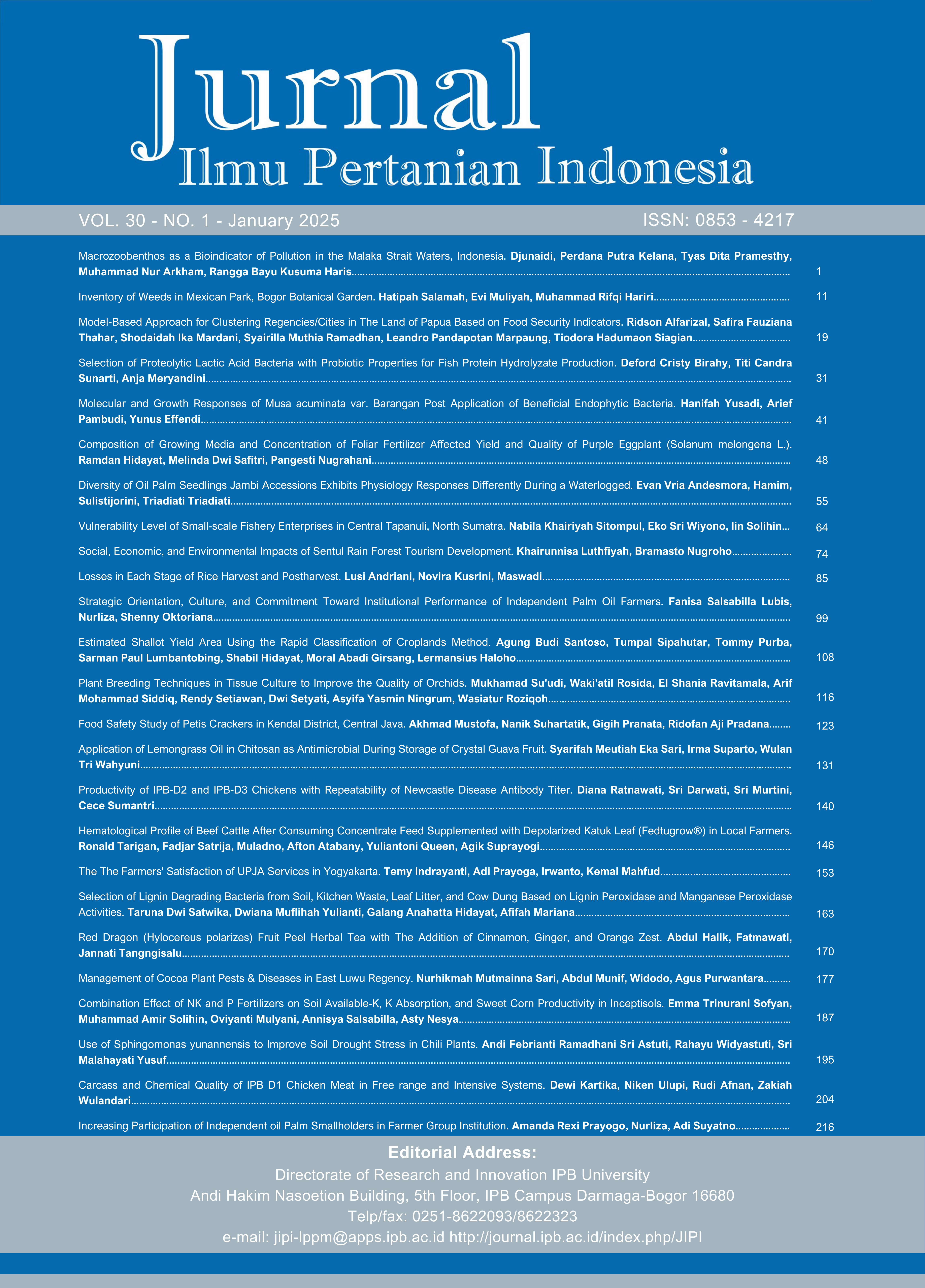Diversity of Oil Palm Seedlings Jambi Accessions Exhibits Physiology Responses Differently During a Waterlogged
Abstract
Cultivated oil palm is commonly found in several ecosystems with different topographies, including riparian areas. This ecosystem is expected to affect the morphology and physiology of oil palms. In addition, oil palm habitats in riparian or flooded ecosystems will experience anaerobic respiration. Indonesia has the potential to access quality palm oil that can be used for cultivation. This study aimed to determine which oil palm accessions could adapt physiologically to the duration of waterlogging. The accession of oil palm seedlings from Jambi tested were Merangin, Tebo, Muara Jambi, Tanjung Jabung, and Simalungun. The research design was to treat waterlogging in a greenhouse and then analyze the plant growth and physiology. Waterlogging was given for two, four, and six weeks. The results showed that the accession of oil palm seedlings and the duration of waterlogging affected photosynthesis rate, transpiration rate, and stomatal conductance. Growth parameters, i.e., fresh weight, dry weight, and root/shoot ratio, were significantly different in accession and waterlogging duration. In conclusion, accessions from Tebo and Merangin can adapt to waterlogging.
Keywords: Merangin accession, photosynthesis rate, stomatal conductance, Tebo accession
Downloads
References
Ashraf MA. 2012. Waterlogging stress in plants: A review. African Journal of Agriculture Research. 7(13): 1976–1981. https://doi.org/10.5897/AJARX11.084
Bailey-Serres J, Colmer TD. 2014. Plant tolerance of flooding stress-recent advances. Plant Cell Environment. 37(10): 2211–2215. https://doi.org/10.1111/pce.12420
BPS Provinsi Jambi. 2020. Luas Area (hektar) dan Produksi (kg) Kelapa Sawit di Provinsi Jambi 2018–2020. https://jambi.bps.go.id/indicator/54/1946/1/luas-area-hektar-dan-produksi-kg-kelapa-sawit-di-provinsi-jambi.html.
Boigné A, Bureau F, Husté A, Levesque S, Delorme A, Quillet L, Langlois E. 2017. Effects of waterlogging levels on Holcus lanatus response traits in different created topsoils. Flora Morphology Distribution Functional Ecology of Plants. 234: 106–118. https://doi.org/10.1016/j.flora.2017.07.006
Brown GC. 2001. Regulation of mitochondrial respiration by nitric oxide inhibition of cytochrome c oxidase. Biochimical and Biophysical Acta-Bioenergy. 1504(1): 46–57. https://doi.org/10.1016/S0005-2728(00)00238-3
De Carvalho CJR, Ishida FY. 2002. Responses of young pijuayo plants (Bactris gasipaes Kunth) to flooding. Pesquisa Agropecuária Brasileira. 37(9): 1231–1237. https://doi.org/10.1590/S0100-204X2002000900005
Directorate General of Estates. 2020. Statistical of National Leading Estate Crops Commodity 2020–2022 (Jakarta: Secretariate of Directorate General of Estates).
Centenaro G, Hudek C, Zanella A, Crivellaro A. 2018. Root-soil physical and biotic interactions with a focus on tree root systems: A review. Appied. Soil Ecology. 123: 318–327. https://doi.org/10.1016/j.apsoil.2017.09.017
Copolovici L, Niinemets Ü. 2010. Flooding induced emissions of volatile signalling compounds in three tree species with differing waterlogging tolerance. Plant, Cell & Environment. 33(9): 1582–1594. https://doi.org/10.1111/j.1365-3040.2010.02166.x
Garssen AG, Baattrup-Pedersen A, Voesenek LACJ, Verhoeven JTA, Soons MB. 2015. Riparian plant community responses to increased flooding: A meta-analysis. Global Change Biology. Bioenergy. 21(8): 2881–2890. https://doi.org/10.1111/gcb.12921
Gibson DJ, Bardgett RD, Rees M, Baier A, Sandhu L, Newton E. 2013. Journal of Ecology News: Data Archiving Compliance. Journal of Ecology. 104(1): 1-3. https://doi.org/10.1111/1365-2745.12502
Gupta KJ, Shah JK, Brotman Y, Jahnke K, Willmitzer L, Kaiser WM, Bauwe H, Igamberdiev AU. 2012. Inhibition of aconitase by nitric oxide leads to induction of the alternative oxidase and to a shift of metabolism towards biosynthesis of amino acids. Journal of Experimental Botany. 63(4): 1773–1784. https://doi.org/10.1093/jxb/ers053
Gurevitch J, Scheiner SM, Fox GA. 2002. Water relations and energy balance. In The Ecology of Plants. Sunderland (GB): Sinauer Associates.
Ashraf MA. 2012. Waterlogging stress in plants: A review. African Journal of Agriculture Research. 7(13): 1976–1981. https://doi.org/10.5897/AJARX11.084
Herzog M, Striker GG, Colmer TD, Pedersen O. 2016. Mechanisms of waterlogging tolerance in wheat: A review of root and shoot physiology. Plant Cell Environ. 39(5): 1068–1086. https://doi.org/10.1111/pce.12676
Hough-Snee N, Nackley LL, Kim SH, Ewing K. 2015. Does plant performance under stress explain divergent life history strategies? The effects of flooding and nutrient stress on two wetland sedges. Aquatic Botany. 120: 151–159. https://doi.org/10.1016/j.aquabot.2014.03.001
Jackson MB, Colmer TD. 2005. Response and adaptation by plants to flooding stress. Annals of Botany. 96(4): 501–505. https://doi.org/10.1093/aob/mci205
Jing YX, Li GL, Gu BH, Yang DJ, Xiao L, Liu RX, Peng CL. 2009. Leaf gas exchange, chlorophyll fluorescence and growth responses of Melaleuca alternifolia seedlings to flooding and subsequent recovery. Photosynthetica. 47(4): 595–601. https://doi.org/10.1007/s11099-009-0085-5
Kadam S, Abril A, Dhanapal AP, Koester RP, Vermerris W, Jose S, Fritschi FB. 2017. Characterization and regulation of aquaporin genes of sorghum [Sorghum bicolor (L.) Moench] in response to waterlogging stress. Frontiers in Plant Science. 8: 1–14. https://doi.org/10.3389/fpls.2017.00862
Kreuzwieser J, Papadopoulou E, Rennenberg H. 2004. Interaction of flooding with carbon metabolism of forest trees. Plant Biology. 6(3): 299–306. https://doi.org/10.1055/s-2004-817882
Lamade E, Setiyo I, Purba A. 1998. Gas exchange and carbon allocation of oil palm seedlings submitted to waterlogging in interaction with N fertilizer application. Proceedings. 1998 International Oil Palm Conference. Commodity Past, Today, Future. 573–584.
Lambers H, Chapin FS, Pons TL. 2008. Plant Physiological Ecology. 2nd edition. New York (US): Springer. https://doi.org/10.1007/978-0-387-78341-3
Lichtenthaler HK. 1987. Chlorophylls and Carotenoids: Pigments of photosynthetic biomembranes. Methods in Enzymology. 148: 350–382. https://doi.org/10.1016/0076-6879(87)48036-1
Lin Z, Wang YL, Cheng LS, Zhou LL, Xu QT, Liu DC, Deng XY, Mei FZ, Zhou ZQ. 2021. Mutual regulation of ROS accumulation and cell autophagy in wheat roots under hypoxia stress. Plant Physiology and Biochemistry. 158: 91–102. https://doi.org/10.1016/j.plaphy.2020.11.049
Liu B, Rennenberg H, Kreuzwieser J. 2015. Hypoxia affects nitrogen uptake and distribution in young poplar (populus × canescens) trees. PLoS One. 10(8). https://doi.org/10.1371/journal.pone.0136579
Liu Z, Cheng R, Xiao W, Guo Q, Wang N. 2014. Effect of off-season flooding on growth, photosynthesis, carbohydrate partitioning, and nutrient uptake in Distylium chinense. PLoS One. 9(9). https://doi.org/10.1371/journal.pone.0107636
Martínková J, Hájek T, Adamec L, Klimešová J. 2021. Growth, root respiration and photosynthesis of a root-sprouting short-lived herb after severe biomass removal. Flora. 284. https://doi.org/10.1016/j.flora.2021.151915
Mašková T, Maternová J, Těšitel J. 2022. Shoot: root ratio of seedlings is associated with species niche on soil moisture gradient. Plant Biology. 24(2): 286–291. https://doi.org/10.1111/plb.13352
Mielke MS, De Almeida AAF, Gomes FP, Aguilar MAG, Mangabeira PAO. 2003. Leaf gas exchange, chlorophyll fluorescence and growth responses of Genipa americana seedlings to soil flooding. Environmen and. Experimental Botany. 50(3): 221–231. https://doi.org/10.1016/S0098-8472(03)00036-4
Nakamura T, Nakamura M. 2016. Root respiratory costs of ion uptake, root growth, and root maintenance in wetland plants: efficiency and strategy of O2 use for adaptation to hypoxia. Oecologia. 182(3): 667–678. https://doi.org/10.1007/s00442-016-3691-5
Pawłowicz I, Masajada K. 2019. Aquaporins as a link between water relations and photosynthetic pathway in abiotic stress tolerance in plants. Gene. 687: 166–172. https://doi.org/10.1016/j.gene.2018.11.031
Pedersen O, Sauter M, Colmer TD, Nakazono M. 2021. Regulation of root adaptive anatomical and morphological traits during low soil oxygen. New Phytology. 229(1): 42–49. https://doi.org/10.1111/nph.16375
Phule AS, Barbadikar KM, Madhav MS, Subrahmanyam D, Senguttuvel P, Babu MBBP, Kumar PA. 2019. Studies on root anatomy, morphology and physiology of rice grown under aerobic and anaerobic conditions. Physiology and Molecular Biology of Plants. 25(1): 197–205. https://doi.org/10.1007/s12298-018-0599-z
Ponte NHT, Nunes Santos RI, Lima Lopes Filho WR, Lisboa Cunha R, Murad Magalhães M, Alves Pinheiro H. 2019. Morphological assessments evidence that higher number of pneumatophores improves tolerance to long-term waterlogging in oil palm (Elaeis guineensis) seedlings. Flora Morphology, Distribution, Functional Ecology of Plants. 250: 52–58. https://doi.org/10.1016/j.flora.2018.11.017
Putra SP, Santosa, Salsinha YCF. 2023. Waterlogging and salinity stress affecting growth and morphological character changes of Limnocharis flava. Biodiversitas. 24(1): 333–340. https://doi.org/10.13057/biodiv/d240140
Ranawakage VP, Ellawala KC, Chaminda GGT. 2013. Preliminary study on the influence of water level on the growth and morphology of Limnocharis flava (L.) Buchenau. Annals of Limnology. 49(4): 249–254. https://doi.org/10.1051/limn/2013058
Rivera-Mendes YD, Cuenca JC, Romero HM. 2016. Physiological responses of oil palm (Elaeis guineensis Jacq.) seedlings under different water soil conditions. Agronomia Colombiana. 34(2): 163–171. https://doi.org/10.15446/agron.colomb.v34n2.55568
Salsinha YCF, Indradewa D, Purwestri YA, Rachmawati D. 2020. Selection of drought-tolerant local rice cultivars from east Nusa Tenggara, Indonesia during vegetative stage. Biodiversitas. 21(1): 170–178. https://doi.org/10.13057/biodiv/d210122
Shiva S, Brookes PS, Patel RP, Anderson PG, Darley-Usmar VM. 2001. Nitric oxide partitioning into mitochondrial membranes and the control of respiration at cytochrome c oxidase. Proceedings of National Academy of Science. USA. 98(13): 7212–7217. https://doi.org/10.1073/pnas.131128898
Stra A, Almarwaey LO, Alagoz Y, Moreno JC, Al-Babili S. 2023. Carotenoid metabolism: new insights and synthetic approaches. Frontiers in Plant Science. 13:1–11. https://doi.org/10.1073/pnas.131128898
Taiz L, Zeiger E, Moller IM, Murphy A. 2018. Plant Physiology and Development: International. 6th Edition. Sinauer AD, editor. Sunderland, Massachusetts: Sinauer Associates, Inc.
Tamala U, AL Habib IM, Zuhro F. 2019. Effect of Waterlogging Percentage to Time of of hypoxia some tobacco accessions (Nicotiana tabacum L. Jurnal Biologi Konservasi. 1: 29–37.
Tan X, Janusz JZ. 2019. Stable expression of aquaporins and hypoxia-responsive genes in adventitious roots are linked to maintaining hydraulic conductance in tobacco (Nicotiana tabacum) exposed to root hypoxia. PLoS One. 14(2): 1–13. https://doi.org/10.1371/journal.pone.0212059
Turhadi, Minarsih H, Riyadi I, Priyono., Budiani A. 2020. Physiological responses and P5CS gene expression of transgenic oil palm plantlet induced by drought stress. E-Journal Menara Perkebunan. 88(2): 69–78. https://doi.org/10.22302/iribb.jur.mp.v88i2.386
Wang P, Grimm B. 2021. Connecting chlorophyll metabolism with accumulation of the photosynthetic apparatus. Trends in Plant Science. 26(5): 484–495. https://doi.org/10.1016/j.tplants.2020.12.005
Wu J, Wang J, Hui W, Zhao F, Wang P, Su C, Gong W. 2022. Physiology of plant responses to water stress and related genes: A review. Forests. 13(2). https://doi.org/10.3390/f13020324
Yamasaki H, Shimoji H, Ohshiro Y, Sakihama Y. 2001. Inhibitory effects of nitric oxide on oxidative phosphorylation in plant mitochondria. Nitric Oxide. 5(3): 261–270. https://doi.org/10.1006/niox.2001.0353
Zemlyanukhin AA, Eprintsev AT, Zemlyanukhin LA, Igamberdiev AU. 1984. Subcellular localization of aconitate hydratase isoforms in higher plants. Soviet Plant Physiology. Plant Physiology. 31(2): 270–275. https://doi.org/10.1093/treephys/tpx023
Zúñiga-Feest A, Bustos-Salazar A, Alves F, Martinez V, Smith-Ramírez C. 2017. Physiological and morphological responses to permanent and intermittent waterlogging in seedlings of four evergreen trees of temperate swamp forests. Tree Physiology. 37(6): 779–789.
Zwiazek JJ, Xu H, Tan X, Navarro-Ródenas A, Morte A. 2017. Significance of oxygen transport through aquaporins. Scientific Reports. 7: 1–11. https://doi.org/10.1038/srep40411

This work is licensed under a Creative Commons Attribution-NonCommercial 4.0 International License.
This journal is published under the terms of the Creative Commons Attribution-NonCommercial 4.0 International License. Authors who publish with this journal agree to the following terms: Authors retain copyright and grant the journal right of first publication with the work simultaneously licensed under a Creative Commons Attribution-NonCommercial 4.0 International License. Attribution — You must give appropriate credit, provide a link to the license, and indicate if changes were made. You may do so in any reasonable manner, but not in any way that suggests the licensor endorses you or your use. NonCommercial — You may not use the material for commercial purposes.























